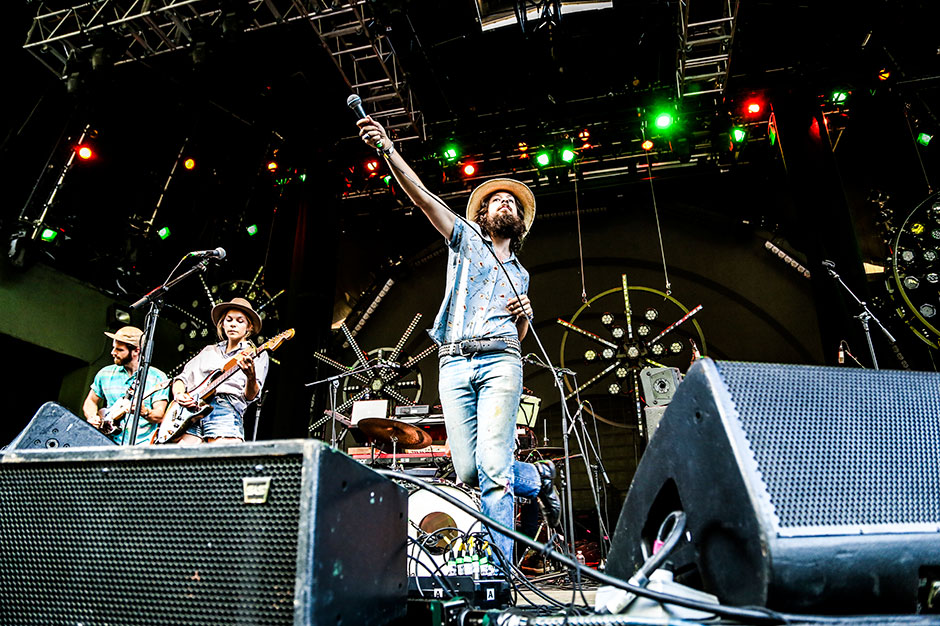Tim Heidecker was obsessed with Donald Trump long before many people, even his most diehard supporters. He embraced the role of a Trump acolyte in his rare standup appearances, long before the 2015-16 campaign; he trolled the former reality-show star for years on social media until last September, when he finally made the “pledge” to unfollow him. Trump-esque egotism, as well as his bemused squints, influenced the titular character in Heidecker’s pseudo-Clancy political thriller series Decker (returning for its third season in June). The grotesque, EDM-producing analog of himself he plays on On Cinema–his Adult Swim talk show about movies with his Hobbit-obsessed partner-in-crime Gregg Turkington, a.k.a. Neil Hamburger–also gave Trump an “official endorsement” last summer: “You could be sitting on the yacht with your beautiful wife and having the time of your life, but you choose to fight for us, the last remaining people who even matter.”
Previous to the rise of Trump, Heidecker has embraced the real-life political sphere in music, too, most notably with Cainthology: Songs in the Key of Cain, a collection of campaign songs for the pizza magnate’s failed presidential bid in 2012. And as Trump’s political prospects deepened, and as American politics grew as garish, absurdist and brutal as his comedy, Heidecker has doubled down on songwriting, making his Soundcloud and Bandcamp page his primary outlets for political frustration.
It’s Heidecker’s expertise on Trump-like figures that makes his ever-expanding catalogue of Trump-centric songs so good. People like the fake Tim of On Cinema and Trump–blustery, prejudiced, slothful doofuses lacking self-awareness–have shown up in his comedy for years. One of his biggest musical influences, after all, embraced the same kinds of puerile characters: Heidecker’s love for Randy Newman, the king of writing pop songs from the perspective of unreliable narrators, is a matter of known fact. When I interviewed Heidecker last year, he explained that Newman’s Good Old Boys, his 1974 concept album centering around a small cast of delusional Southern bigots, including the 1930s fear-mongering populist presidential candidate Huey Long, was “the perfect blend…the concept is perfect.”
Warren Zevon, another of Heidecker’s musical reference points, flipped his own misanthropy into unflinching character studies of Carver-esque ne’er-do-wells, addicts, petulant losers who refuse to accept failure, and straight-up sociopaths. The worst of these guys are the stuff of Heidecker’s comedy. And in the age of Trump, form and subject matter seemed to have perfectly converged.
Like the other obvious comparison point for his recent music, Harry Nilsson, Heidecker’s songs walk a blurred line between outright genre parody and straightforward Laurel-Canyon-pop tunefulness. It’s an unpopular mode of musical operation even for today’s singer-songwriters working in Heidecker’s musical idiom. Other contemporary artists who frequently drum up Nilsson comparisons–Mac DeMarco, Heidecker’s friend and collaborator Father John Misty, Tobias Jesso Jr. and the like–don’t engage in explicit musical parody, preferring to retain a patina of cool or self-righteous sincerity, concerns which are nonexistent in both Nilsson’s and Heidecker’s oeuvre .
Heidecker’s spare home recordings channel the loose, semi improvisational energy of Nilsson’s mid-70s work. Like the tunes on wonderfully messy Nilsson LPs like Son of Schmilsson and Sandman, Heidecker’s Trump songs feel like they were written quickly, with goofy rhymes and extraneous syllables left in the final draft. Pretty folk-pop compositions like “A Note for Donald J. Trump’s Pilot” (later covered by Father John Misty) are mixed with kitschy detours like “Mar a Lago,” which employs a Casiotone tropical groove conjuring “Kokomo” and Margaritaville. “Mar a Lago,” from which Heidecker donated all his Bandcamp proceeds to the Everglades Foundation, may be his best Trump song yet, boasting one of the best prez-as-mewling-child vignettes you’ll find in modern-day Trump comedy: “And on Saturday night when Melania’s fast asleep/I tiptoe to the only room where I really wanna be/Crawling into that beautiful king size bed/And snuggle in between my loves the ‘Vanka and Jared.”
In the song’s lyrics, Heidecker steps fully inside of his caricature of Trump, like Newman at his crassest and most outlandish. Rarely can Trump-related humor prove to be more absurd than the real thing, or cast the situation in a light we haven’t thought about. But sin imagining an overwhelmed Trump afraid to go back the White House (“the haunted mansion”), earnestly singing the praises of the Florida sun, or in imagining a side character driven crazy by his surreal employment situation (as on “Trump’s Pilot”), Heidecker hits the right angles, with economical lyrics.
Piano ballad “Trump Tower” is a personal favorite. It’s his most defeated-sounding, apparently written directly and sincerely from Heidecker’s perspective. It’s a plaintive reaction to the unexpected results of the election, the nerve-racking, seemingly pre-apocalyptic interim period, and the Orwellian inauguration proceedings–a musical response to an undeniably deflating moment. “Since 2010, he’s been the butt of my jokes,” he begins, “and a special guest in my darker dreams.” Just as Alec Baldwin hoped he’d soon be able to retire his SNL Trump facsimile, Heidecker recalls fantasizing about returning to his normal comedic life after Trump, his worst obsession, “eventually choke[d].”
Eventually, the ballad erupts in defiance; Heidecker declares that you’d have to “put [him] on the rack next to my brown and black brothers” in the “bowels” of Trump Tower before he’d “call that motherfucker president” (Heidecker then breaks into a zealous hum, evoking Zevon’s air-conditioner onomatopoeia in “Desperados Under the Eaves.”) The nightmarish dungeons he imagines underneath Trump’s Manhattan monolith recall the mangled bodies and murderous rites of the other most on-the-money piece of Trump-era fiction, The Purge: Election Year.
“Trump Tower”–like Heidecker’s contribution to the Our First 100 Days compilation “Trump Talkin’ Nukes”–is hyperbolic and theatrical, but Heidecker’s passion and energy makes the recordings feel like an intimate window into his own psychology. The melodies are simple and instinctive; the lyrics are more thoughtful extensions of his snarky-or-vitriolic anti-Trump social media missives, and posted almost as immediately. (Heidecker’s smooth, folk-rock triumph “Richard Spencer,” in which God himself asks the narrator to punch the white-nationalist figurehead in the face, went up as soon as the relevant video meme was cresting in late January).
Everything from his most serious to whacked-out offering–say, last year’s “I Am a Cuck,” written to the tune of Simon and Garfunkel’s “I Am a Rock”–are full of observations alternately bleak, belligerent, and soberly astute. His best songs easily channel many Americans’ darkest, day-to-day impressions since the election. Heidecker’s Trump songs are non-opportunistic and non-performative, unlike so many expressions of political outrage online, which helps them continue to be unerringly funny, even while taking on a subject that’s increasingly impossible to meaningfully parody.





